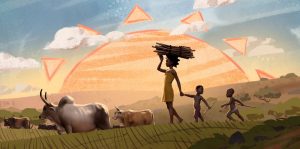
Metaphor can be a handy tool for exploring complex themes, particularly for children. They can learn to work through their feelings with figurative symbols softening the blow of literal calamity. It works for adults, too, as in Liyana, where a crowdfunded, multimedia documentary about the country with the highest HIV rate in the world is made significantly more accessible through the lens of animation. Husband-and-wife filmmaking team Aaron and Amanda Kopp use the freedom that comes along with the medium of fable to celebrate the resilience of the creative spirit.
In order to provide a group of orphaned Swazi children with both a stage and a therapist’s couch, author Gcina Mhlophe hosts a storytelling workshop, allowing them to process the atrocities they’ve seen. “Pictures and words,” she instructs them, “No right or wrong answers. Only good ideas.” Collectively, they create the eponymous Liyana, a brave, young heroine who must journey across a land of bitter turmoil to rescue her kidnapped brothers. Their vision is animated on the screen, as painful memories become fodder for stunning visual poetry.
“…a brave, young heroine who must journey across a land of bitter turmoil to rescue her kidnapped brothers.”
Where our storytellers’ minds instinctively go is extremely telling of their turbulent past. When we prepare to hear a narrative constructed by a child, we aren’t normally ready for rape, AIDS, and alcoholism to serve as major plot beats. But when you spend your formative years in a country where one in four adults test positive for HIV, it’s impossible not to internalize an alternate view of death and family. Artists pull from their surroundings, and what will make Liyana so severely unnerving for Western viewers stems from simply providing these children an opportunity to bare their soul.
Even as we hear the gut-wrenching first-hand accounts and are presented with unsettling mortality statistics, there is an undeniable wave of hope that permeates Liyana, mainly because of the youthful enthusiasm of its narrators. Because of their willingness to entertain, children are natural storytellers, acting out movement with their hands and providing comical sound effects. Their infectious spirit coupled with the lively animation serves as a welcome juxtaposition to their harrowing tale.
“…we aren’t normally ready for rape, AIDS, and alcoholism to serve as major plot beats…”
Though Liyana often feels more like an exercise in storytelling than a complete narrative, it is heartwarming to see the kids light up as they work together to create art out of their hardship. As therapeutic for its subjects as it is for its audience, the documentary keeps from sensationalizing its distressing setting, presenting it instead as it appears through the eyes of a child. As our charismatic orphans channel their pain into a collaborative brainstorm, the Kopps allow their stars to tell their own story, rather than create one on their behalf.

Liyana (2018) Directed by Aaron Kopp, Amanda Kopp. Starring Gcina Mhlophe, Phumlani, Nomcebo, Sibusiso, Mkhuleko, and Zweli. Liyana screened at the 2018 Chicago Critics Film Festival.
7 out of 10
